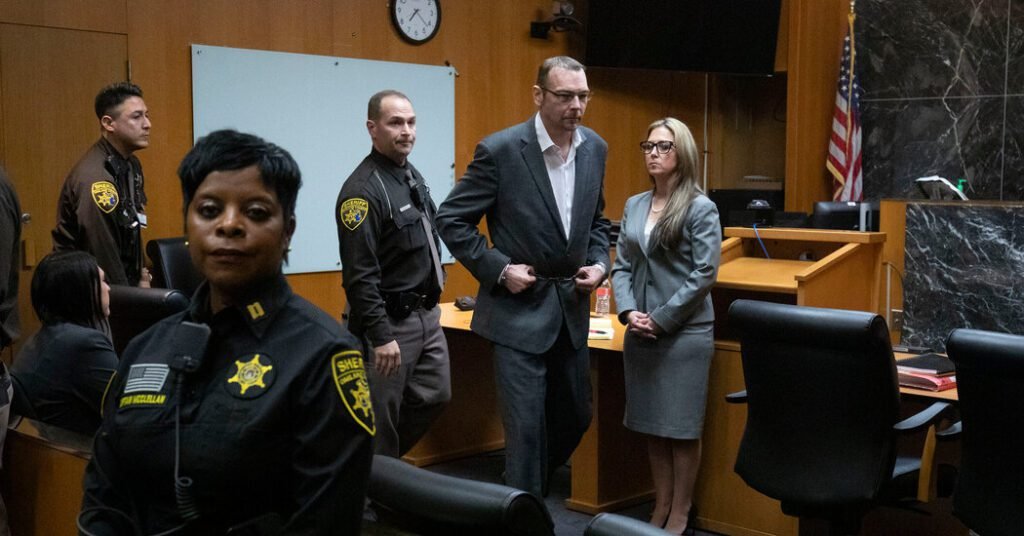A jury found James Crumbley guilty of involuntary manslaughter late Thursday for failing to stop his teenage son from killing four of his classmates and injuring seven others in Michigan’s deadliest school shooting.
Mr. Crumbley and his wife, Jennifer Crumbley, who were found guilty of the same charges in a separate trial last month, are the first parents in the country to be directly charged in the deaths of their child in a mass shooting.
Their prosecutions were seen as part of a national effort to hold certain parents responsible for the deadly violence of their children. In the Crumbleys’ trials, “the prosecution here found a playbook,” said Mark D. Chutkow, a lawyer and former federal prosecutor in Michigan.
Prosecutors argued that the Crumbleys ignored warning signs of the massacre, painting Mrs. Crumbley as a distant and neglectful mother and accusing Mr. Crumbley of failing to secure the gun used in the shooting.
“James Crumbley had the easiest, most glaring opportunities to prevent the deaths of these four students,” Oakland County District Attorney Karen McDonald said in closing arguments Wednesday. “And he did nothing.”
Oakland County prosecutors charged the Crumbleys three days after the shooting that killed Madisyn Baldwin, 17. Tate Myre, 16; Justin Schilling, 17; and Hana St. Juliana, 14.
Mariell Lehman, Mr Crumbley’s defense lawyer, urged the jury to consider how much Mr Crumbley could not have known until it was too late. “You didn’t hear any testimony and you didn’t see any evidence that James knew his son was a danger to anyone,” he said.
The Crumbleys face a maximum of 15 years in prison. Their son, Ethan, pleaded guilty to 24 counts, including first-degree murder, and was sentenced last year to life in prison without the possibility of parole. He did not testify at any of his parents’ trials.
Mr Crumbley has been in prison since December 2021. He and his wife asked for separate trials and unlike her, Mr Crumbley chose not to testify in his own defence.
The trials became a lightning rod for parenting issues in an era of high-profile juvenile gun violence. In recent months, parents in other states have pleaded guilty to reckless conduct or neglect after their children injured or killed others with guns.
But while Mr. Crumbley’s trial could serve as a playbook for prosecutors seeking to hold parents accountable, Mr. Chutkow said, the case is too unique to set a broad precedent. “It’s a weird case because the number of red flags the parents had were — there were so many,” he said.
The witness lists in Crumbley’s two trials were similar, but there were some key differences in the evidence presented. At Mrs Crumbley’s trial, lawyers reviewed her communications with her son, including text messages spanning months.
But in Mr. Crumbley’s case, the testimony focused less on his parenting and more on the Sig Sauer handgun that prosecutors say he bought his son as a first Christmas gift four days before the shooting.
Law enforcement officials who searched the Crumbleys’ home shortly after the attack testified this week that they found the gun’s storage case open on their parents’ bed, along with an empty box of ammunition. They said there was no indication the case was locked.
In closing arguments Wednesday, Ms. Lehman said that before the shooting, Mr. Crumbley did not know if his son knew where the gun was hidden. During her rebuttal, Ms McDonald donned a pair of gloves, took the murder weapon and a cable lock and showed the jury that the gun could be locked in seconds.
Prosecutors also described to the jury various entries in the shooter’s diary, including one that appeared to be written the day before the shooting. “I have access to the gun and ammo,” the listing said. “I’m fully committed to it now.”
It was unclear if either of the shooter’s parents had seen the diary entries before the shooting. But they were called to the school on the morning of November 30 after a teacher saw their son making violent drawings. These drawings included an object that looked like the gun Mr Crumbley had bought and phrases such as ‘help me’ and ‘blood everywhere’.
Neither the Crumbleys nor school officials searched the teenager’s backpack, which contained the gun.
Mr Crumbley, wearing a gray suit and blue tie, appeared somber and shook his head slightly on Thursday afternoon as the court’s four guilty verdicts – one on each count of manslaughter – were announced. Sheriff’s Department officers handcuffed him and led him out of the courtroom.
Prosecutors called 15 witnesses at Mr. Crumbley’s trial, including people who saw the shooting and law enforcement officials who investigated it. The defense called only one witness: Karen Crumbley, the defendant’s sister. She said that until the shooting, she had never seen reason to worry too much about her nephew.
Neither did Mr. Crumbley, according to his lawyer.
“He didn’t know,” Ms Lehman told the jury. “He didn’t know what was going on with his son. He didn’t know what his son was planning.”

